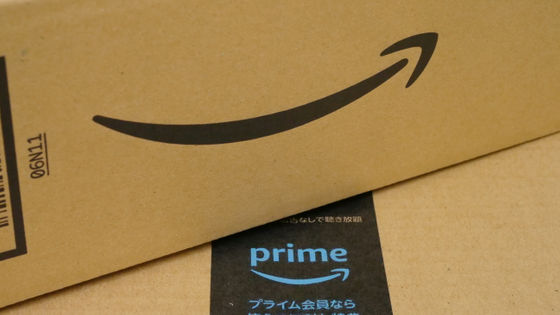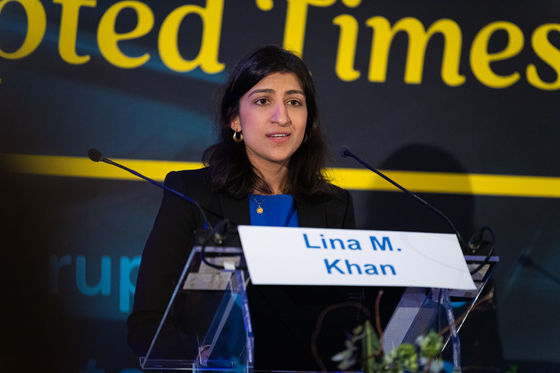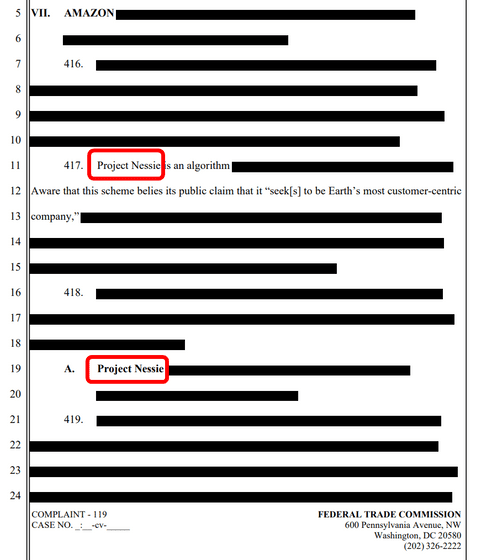Amazon is being sued by regulators and 17 states for violating antitrust laws, and the existence of a mysterious price manipulation algorithm called ``Project Nessie'' has also come to light

On September 26, 2023, the U.S. Federal Trade Commission (FTC) announced that it had filed a lawsuit against Amazon, along with attorneys general from 17 states, alleging illegal conduct that hindered competition and exercised monopoly power to raise prices. did.
FTC Sues Amazon for Illegal Maintaining Monopoly Power | Federal Trade Commission
Amazon responds to FTC antitrust lawsuit: Read our full statement
https://www.aboutamazon.com/news/company-news/amazon-ftc-antitrust-lawsuit-full-response
Amazon sued by FTC and 17 states over alleging it inflates online prices and overcharges sellers | AP News
https://apnews.com/article/amazon-ftc-lawsuit-antitrust-1b91bf8026cc3edf81e817cf8596c4bf
FTC targets alleged secret Amazon pricing algorithm 'Project Nessie' in antitrust complaint – GeekWire
https://www.geekwire.com/2023/ftc-targets-alleged-secret-amazon-pricing-algorithm-project-nessie-in-antitrust-complaint/
The FTC alleges that Amazon engages in anticompetitive conduct in two areas: its online supermarket marketplace for shoppers and its online marketplace of services for sellers.
First, in terms of consumer services, they are imposing sanctions on sellers to prevent them from offering lower prices than Amazon on other online services. For example, if Amazon discovers that a seller is offering a product cheaper elsewhere than Amazon, Amazon may push that seller's product to the bottom of the search results, keeping the cheaper product away from consumers' eyes. The FTC points out.
Additionally, in the marketplace, there was a problem with the fact that unless you use Amazon's delivery service, you cannot qualify for ``Amazon Prime eligible products'', which is a de facto requirement when doing business on Amazon. . This semi-forces sellers to use Fulfillment by Amazon (FBA) , making it much more expensive for marketplace sellers to sell their products on other platforms, making competing services less competitive. It is said that they are at a significant disadvantage.

The complaint also alleges that Amazon degrades the customer experience by running paid ads instead of providing more relevant search results, favors its own brands over higher-quality products from other companies, and charges sellers high fees. It has been criticized for imposing According to one estimate, the fees that sellers pay to Amazon have increased from 19% in 2014 and 35% in 2020 to nearly 50% of total revenue at the time of article creation.
The FTC's complaint states: Connecticut, Delaware, Maine, Maryland, Massachusetts, Michigan, Minnesota, New Jersey, New Hampshire, New Mexico, Nevada, New York, Oklahoma, Oregon, and Pennsylvania. The list includes attorneys general from 17 states, Rhode Island and Wisconsin.
In addition, FTC Chairman Lina M. Khan made a name for herself with her paper ``Amazon's Antitrust Paradox'' published while attending law school, and has been an anti-Amazon standard-bearer since her inauguration. This major lawsuit is said to be a major turning point in Chairman Khan's career.
'Our complaint alleges that Amazon abuses its monopoly power to enrich itself, while the tens of millions of households that shop on Amazon and depend on it,' Khan said in a statement. Describes a lawsuit that exposes hundreds of thousands of companies that have hiked prices and degraded service. Today's lawsuit holds Amazon accountable for these monopolistic practices and lost We are calling for a return to free and fair competition.'

by
Amazon, on the other hand, is opposing the FTC's lawsuit, saying that it will cause price increases and delivery delays that will put consumers at a disadvantage and also cause damage to businesses.
David Zapolsky, Amazon's general counsel, said in a blog post: 'The FTC's lawsuit highlights our company's practices of emphasizing only competitive prices and matching lower prices offered by other retailers. 'The FTC's claims that we somehow force sellers to use optional services like FBA are simply not true.' , denying the FTC's findings.
In addition, the public version of the complaint (PDF file) filed by the FTC mentions the term 'Project Nessie' 16 times, marking the first time Amazon's pricing algorithm has been mentioned in a public document. The details are unclear as most of it is painted black.

According to the IT news site Geekwire, the word 'Nessie' also appeared in an Amazon blog article published in 2018, where it was introduced as the name of the building at Amazon's Seattle headquarters, and 'Nessie' was introduced as the name of the building at Amazon's Seattle headquarters. It is also described as a system used to monitor trends on com.
Regarding ``Project Nessie,'' Geekwire points out that ``The FTC's complaint includes allegations that Amazon is overcharging customers around the blacked-out Nessie description.'' .
Related Posts:
in Web Service, Posted by log1l_ks







